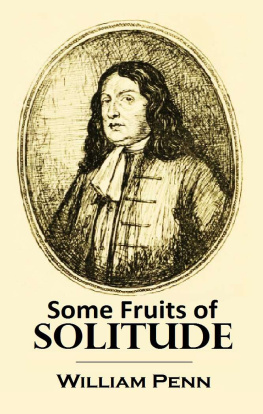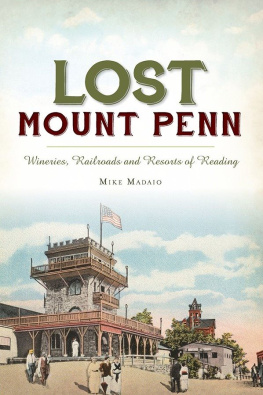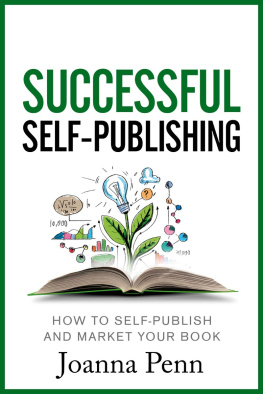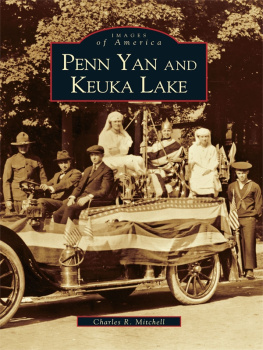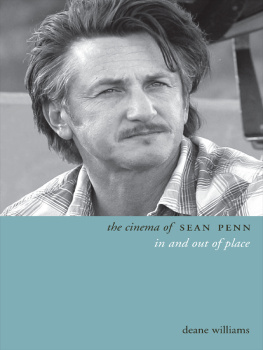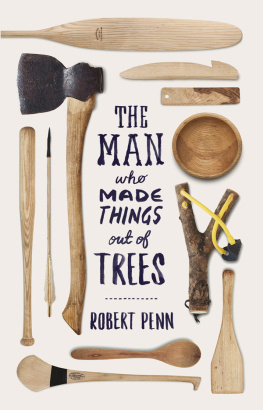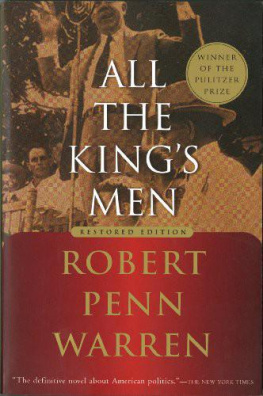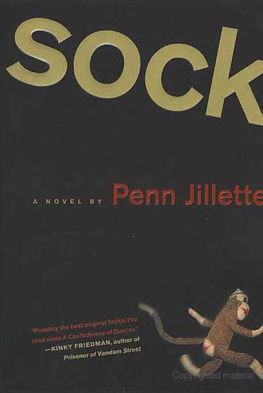William Penn [Penn - Some Fruits of Solitude (1905) (Linked Table of Contents)
Here you can read online William Penn [Penn - Some Fruits of Solitude (1905) (Linked Table of Contents) full text of the book (entire story) in english for free. Download pdf and epub, get meaning, cover and reviews about this ebook. year: 2016, publisher: UNKNOWN, genre: Science. Description of the work, (preface) as well as reviews are available. Best literature library LitArk.com created for fans of good reading and offers a wide selection of genres:
Romance novel
Science fiction
Adventure
Detective
Science
History
Home and family
Prose
Art
Politics
Computer
Non-fiction
Religion
Business
Children
Humor
Choose a favorite category and find really read worthwhile books. Enjoy immersion in the world of imagination, feel the emotions of the characters or learn something new for yourself, make an fascinating discovery.
- Book:Some Fruits of Solitude (1905) (Linked Table of Contents)
- Author:
- Publisher:UNKNOWN
- Genre:
- Year:2016
- Rating:3 / 5
- Favourites:Add to favourites
- Your mark:
- 60
- 1
- 2
- 3
- 4
- 5
Some Fruits of Solitude (1905) (Linked Table of Contents): summary, description and annotation
We offer to read an annotation, description, summary or preface (depends on what the author of the book "Some Fruits of Solitude (1905) (Linked Table of Contents)" wrote himself). If you haven't found the necessary information about the book — write in the comments, we will try to find it.
William Penn [Penn: author's other books
Who wrote Some Fruits of Solitude (1905) (Linked Table of Contents)? Find out the surname, the name of the author of the book and a list of all author's works by series.
Some Fruits of Solitude (1905) (Linked Table of Contents) — read online for free the complete book (whole text) full work
Below is the text of the book, divided by pages. System saving the place of the last page read, allows you to conveniently read the book "Some Fruits of Solitude (1905) (Linked Table of Contents)" online for free, without having to search again every time where you left off. Put a bookmark, and you can go to the page where you finished reading at any time.
Font size:
Interval:
Bookmark:
Some Fruits of
Solitude

William Penn
Originally published by
Headley in 1905
Table of Contents
INTRODUCTION.
This book belongs, in part to the literature of aphorism, and altogether to the literature of practical wisdom. Its purpose and inspiration, its substance and sense place it on the shelf by the side of the Book of Proverbs, and the Book of the Wisdom of Jesus, the son of Sirach. It is, and it is meant to be," profitable for teaching, for reproof, for correction, for instruction which is in righteousness, that the man of God may be complete; furnished completely unto every good work."
Penn describes it quite accurately when he says it contains "Hints that may serve the reader for texts to preach to himself upon." That is what it is meant to constrain the reader to do. That explains its material, its construction, and its effect. It sets a man talking to, and counselling himself. It stimulates and cleanses his thought, makes it sane and balanced, saves it from waste and wildness, and directs to noble doing. An "Enchiridion" is the name given it by our author; that is, its function; it is a hand-book to that conduct which is three fourths of life, and more; a manual of the manners that really make the man.
Much of the sifted wisdom of the ages is here. It is a summing up and classifying of the vast results of human experience by an expert in the art and science of living; expressed with great simplicity and naturalness in compact, cogent and clear English. The writer makes no claim to originality. His quest is for truth, practical truth; the truth, by which men may not only live; but live well.
There is scarcely a weak or innutritious sentence in the book. It is wisdom's essence offered in a portable compass. As a compendium of concentrated spiritual nutriment it would be hard to surpass it. A fine, ethical sagacity lights up its pages, and there is an unfailing supply of the salt of common sense. It often soars to the highest wisdom; but there is no cheap disdain for the homely maxims that guide the traveller on the lower roads of experience,and though the debt to the past is large, yet here and there are brilliant foregleams of the coming and conquering ideas of our own day.
William Penn was a man of faith and hope, and his "fruits of solitude" are ripe and juicy. He is always cheerful. Humour abounds, quiet but full of light; creating pleasure, but always informing. There is mordant satire, exposing folly and vanity, but persuading to repentance. Throughout there is a warm human sympathy, and the wisdom that is a refuge in trouble, a solace in distress, and a well of refreshing for the timid pilgrim tired and footsore on the ways of life. Whilst many passages remind one of the practicality of Woolman, and others of the transcendentalism of Emerson, and still, others of the wit and directness of Bacon; there is not one that suggests the depravity of Macchiavelli, or the cynicism of La Rochefoucauld, or the despair of Schopenhauer.
Young men and maidens will find it a welcome daily companion, and the more mature will feed their faith and burnish their hope, as they meditate on its Maxims.
For Maxims is what the book is made of; short sentences, briefly expressed hints, aphorisms, apothegms. "The style is the man" we say; but not entirely; the style is the man plus the age in which he lives: and therefore Perm's mind, independent as it is in its observation and conclusions, is not closed to the French literary influence which has invaded and is ruling the literary England of his day. He follows the fashion in aphoristic expression. Nothing is elaborated. Everything is stated shortly and tersely. Compression, point, suggestion, portability are aimed at. Mr. Edmund Gosse says, "The form of 'Some Fruits of Solitude' is wholly due to the influence of La Rochefoucauld's famous compendium of sentences, the vogue of which was at its height in England when Penn wrote." But though our author follows the fashion in his style, the substance of his work is his own: "the fruits" are grown in his own orchard. His opportunities for prolonged meditation were many. He was in prisons oft. The gaols were his study and his temple of worship. Into the Tower and Newgate he was thrust for conscience sake, and when he escaped the prison he had to hide in the Sussex woods, and in these solitudes he revised and re-cast his thoughts and finally gave the world not only this revelation of himself, of his aims, his ideals and his spirit; but a message of which R. L. Stevenson said, "There is not a man living, no, nor recently dead, that could put with so lovely a spirit so much honest, kind wisdom into words."
That is the witness of one of a great company, who in successive generations have partaken of these fruits and been healed, refreshed and strengthened by their properties. Stevenson was a wanderer on the face of the earth, just escaped out of the grip of a shattering illness, when sick unto death, he suddenly came upon a copy of this book, and found it food for courage and faith, medicine for despondency, and a solace for sadness. It was as the breath of heaven to his spirit. He tells us he "carried it in his pocket all about San Francisco streets, read it in the cars and ferry boats "; spoke of it as "a sweet, dignified and wholesome book," an "invaluable present," and "at all times and places a peaceful and sweet companion." Since this fruitful tree was planted in the gardens of literature on the 24th of May, 1693, thousands have sat under its branches and have been braced and fortified for life by its produce. This new edition will largely increase their number!
John Clifford.
May, 1905.
THE PREFACE.
READER,This Enchiridion, I present thee with, is the Fruit of Solitude: A School few care to learn in, tho' None instructs us better. Some Parts of it are the Result of serious Reflection: Others the Flashings of Lucid Intervals: Writ for private Satisfaction, and now publish'd for an Help to Human Conduct.
The Author blesseth God for his Retirement, and kisses that Gentle Hand which led him into it: For though it should prove Barren to the World, it can never do so to him.
He has now had some Time he could call his own; a Property he was never so much Master of before: In which he has taken a View of himself and the World; and observed wherein he hath hit and mist the Mark; What might have been done, what mended, and what avoided in his Human Conduct: Together with the Omissions and Excesses of others, as well Societies and Governments, as private Families, and Persons. And he verily thinks, were he to live over his Life again, he could not only, with God's Grace, serve Him, but his Neighbour and himself, better than he hath done, and have Seven Years of his Time to spare. And yet perhaps he hath not been the Worst or the Idlest Man in the World; nor is he the Oldest. And this is the rather said, that it might quicken Thee, Reader, to lose none of the Time that is yet thine.
There is nothing of which we are apt to be so lavish as of Time, and about which we ought to be more solicitous; since without it we can do nothing in this World. Time is what we want most, but what, alas ! we use worst; and for which God will certainly most strictly reckon with us, when Time shall be no more.
It is of that Moment to us in Reference to both Worlds, that I can hardly wish any Man better, than that he would seriously consider what he does with his Time: How and to What Ends he Employs it; and what Returns he makes to God, his Neighbour and Himself for it. Will he ne'er have a Leidger for this? This, the greatest Wisdom and Work of Life, To come but once into the World, and Trifle away our true Enjoyment of it, and of our selves in it, is lamentable indeed. This one Reflection would yield a thinking Person great Instruction. And since nothing below Man can so Think; Man, in being Thoughtless, must needs fall below himself. And that, to be sure, such do, as are unconcern'd in the Use of their most Precious Time.
Next pageFont size:
Interval:
Bookmark:
Similar books «Some Fruits of Solitude (1905) (Linked Table of Contents)»
Look at similar books to Some Fruits of Solitude (1905) (Linked Table of Contents). We have selected literature similar in name and meaning in the hope of providing readers with more options to find new, interesting, not yet read works.
Discussion, reviews of the book Some Fruits of Solitude (1905) (Linked Table of Contents) and just readers' own opinions. Leave your comments, write what you think about the work, its meaning or the main characters. Specify what exactly you liked and what you didn't like, and why you think so.

